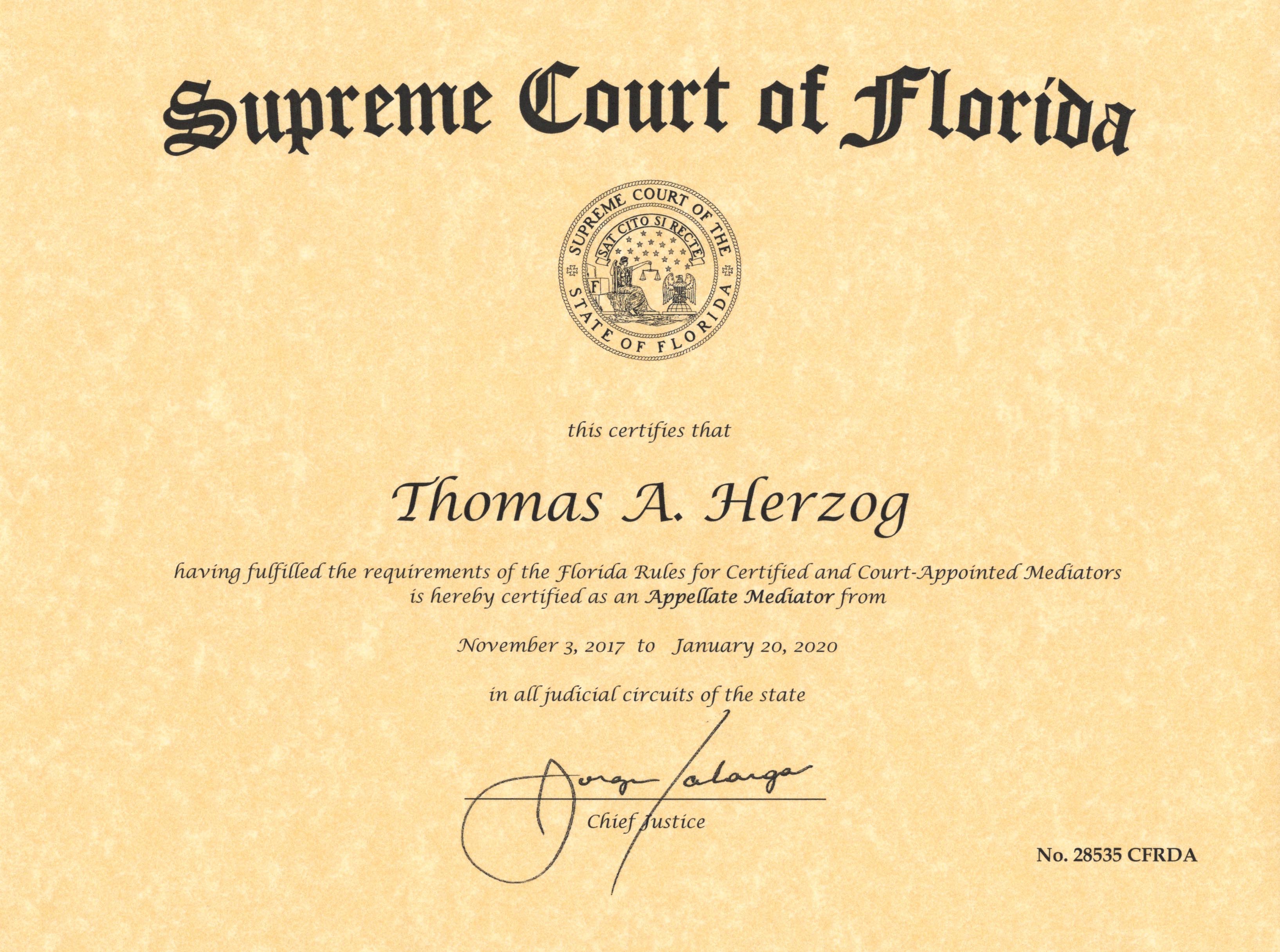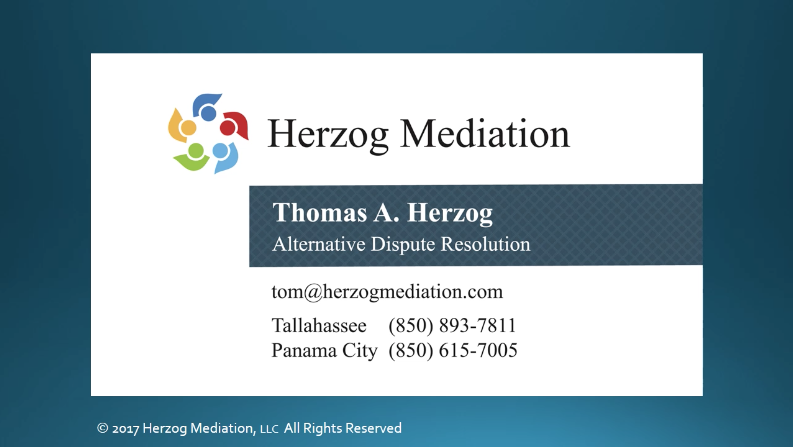by Tom | Aug 3, 2018 | News
“The Quicker, Less Expensive Alternative”
In Pre-Suit Mediation, the entire controversy can be resolved prior to or instead of court.
Pre-Suit Mediation has numerous advantages which include not only the saving of time and money but also less stress than associated with participating in the court process.
Parties benefit in more timely settlements, and reduced legal fees, all presented in a more relaxed atmosphere.
This process permits pre-suit statements from the parties. Herzog Mediation, LLC will take responsibility for seeing that relevant basic information is exchanged between the parties prior to mediation.

by Tom | Nov 7, 2017 | News
I am pleased to announce that today, I received my certificate from The Florida Supreme Court allowing me to conduct Appellate Mediation.
Florida certifies individuals to conduct Mediations in the following five areas:
Appellate, County, Circuit Civil, Family, and Dependency.
I have been certified in four areas for the last few years.
Having all certifications puts me in a group of less than 100 Mediators certified by the Florida Supreme Court in all five areas.
by Tom | Jan 8, 2017 | News
The short answer is YES, although many people can be mediators: mental health, or business professionals, educators; and others. Only those mediators who are certified by the Florida Supreme Court in specific areas (County, Circuit, Family, Dependency, and Appellate) can claim to be a “Florida Supreme Court Certified Mediator” and with the specific area of certification i.e. Family etc. can be assigned cases directly from the court. Florida Supreme Court mediator’s must meet many requirements such as background check, training, re-certification every two years, and ethical standards for mediators adopted by the Florida Supreme Court.
A mediator helps you talk with the party with whom you are having a dispute. The mediator does not make decisions for you. The mediator is a neutral and impartial guide to help you come up with possible solutions, stay on track, and clarify areas of agreement and disagreement. The mediator may help you and the other party see the conflict from each others point of view.
A mediator is not there to provide therapy, counseling, business or legal advice. While mediation is a good place to recognize the emotions that may be driving the dispute, the mediator is there as a neutral to help you focus on resolving your dispute.
by Tom | Jun 2, 2016 | News
Mediation is a form of alternative dispute resolution and an extremely effective means of resolving disputes that allows the couple to decide how a divorce or family matter is going to be resolved through the assistance and guidance of a professional divorce mediator. It is an informal meeting outside of court attended by the couple (and attorneys, if represented) for the specific purpose of trying to settle the divorce or family matter in a non-threatening environment.
What is the role of the mediator?
The mediator is a neutral and independent third party, not otherwise involved in the dispute or litigation, hired to help the couples engaged in the divorce process reach a mutually satisfactory comprehensive agreement. The mediator does not take sides in the matter or give legal advice to the divorcing parties. The mediator does not decide the case for the couples; he helps the couples reach their own solution in a fair, comprehensive and reasonable way to both.
What about confidentiality?
With very limited exceptions, what happens at divorce mediation stays at a divorce mediation. The couples cannot tell the judge what happened nor can the divorce mediator be called to testify at trial. This confidentiality allows the couples to speak openly and candidly without fear that something said can be used against them at trial.

How does the divorce mediation process work?
Opening – All parties and attorneys (if the parties are represented) gather together to discuss the process and the positions of the parties. The mediator discusses the mediation process and directs the discussion among the parties. There may be occasions, particularly in divorce or family law matters that are already in serious litigation, where the parties do not get together for an “opening”. The mediator will instead meet with each side individually to discuss the divorce process and determine positions.
Caucus – In a divorce or family matter where the parties are not represented by attorneys, the parties typically remain in the same room with the mediator. This arrangement helps the process of dialog, communication and agreement. (It also takes less time and therefore costs less.) In the event private discussions are necessary, the parties separate into different rooms and the divorce mediator meets with each side privately, going back and forth between the groups discussing issues, gathering information and conveying offers or demands.
Agreement – At the end of the mediation, a written document is prepared for the signature of the parties outlining the terms of the settlement agreed to by the parties. The mediator will assist in the preparation of this document but the terms and agreements are those agreed to by the parties. You should not expect to get everything you want in a settlement, as compromise is necessary to achieve a solution. However, by actively participating in the mediation process solution, you will more likely be able to live with it — certainly more than you would an adverse decision forced upon you by a court.
When is mediation appropriate?
Mediation is appropriate anytime, even in the middle of divorce litigation process.
- Before suit is filed
- Before extensive discovery is undertaken
- When a settlement can accomplish a result unobtainable in litigation
- When the parties want the ability to determine the outcome themselves
- When a earlier determination than going to trial is desired
- When a cheaper alternative than going to trial is desired
- When the parties want a matter to remain private
- When the parties need to resolve a dispute but desire to retain an existing relationship
- When ordered by the court
What are the benefits of mediation?
- Much lower cost than proceeding with attorneys, especially through trial
- An earlier and/or quicker resolution to the matter
- Parties can assess strengths and weaknesses of both sides
- More flexible and creative outcomes
- You control the outcome
- You have a chance to be heard
- You have ownership of your agreement and can be proud of the result
- You save emotional strain
by Tom | Jun 2, 2016 | News
Mediation is not only for couples that agree. It is a process designed to help any couple even when you may not be able to imagine any agreement would be possible. In fact, mediation is often most helpful when a couple finds it difficult to talk on their own. Mediation will address not only the legal requirements for a divorce or other family matters, but also your individual needs.
Divorce or Family Mediation may be right for you:
- for married couples who have made a decision to divorce;
- where a separation (but not necessarily a divorce) is needed;
- if saving time, money and anguish are more important than the desire to crush your spouse through long and expensive litigation;
- if saving the family’s assets to begin the next phase of your lives instead of huge legal fees makes sense;
- if you and your spouse creating a parenting plan and a financial plan to guide you in the future – not one done by lawyers and/or a judge – makes sense;
- if minimizing the emotional toll on a divorce can cause you and your children makes sense;
- if you prefer to keep the details of your case private and confidential;
- even if you seem to not be able to agree with your spouse on anything!
- if you need to have an existing agreement or order modified.
What the Mediator does:
A mediator is a neutral, impartial third party who does not take sides in the divorce process. His job is to help you and your spouse find an answer and agreement to the issues and questions that will need to be decided in your divorce. These issues can include:
- distribution of assets, money and property;
- allocation of debts;
- a parenting plan for the children (previously called custody and visitation);
- child support;
- alimony;
- Prepares the Marital Settlement Agreement and other court documents, if requested
The mediator will help and guide you in coming to an agreement that both have participated in achieving and that both can live with – rather than one that will be forced on you by the court.
What the Mediator doesn’t do:
- He is not a marriage counselor so he will not try to save your marriage;
- He is not a judge so he will not decide issues for you or tell you what to do;
- He is not your lawyer so he cannot give you legal advice (you can have an attorney review the documents prior to signing, if you like);
- He does not take sides or cast blame on anyone;
When Mediation May not Work
In circumstances where one of the parties may not be able to assert his/her needs or does not feel free to speak his/her mind without fear of consequences, mediation may not be appropriate. Mediation can still be effective even in domestic abuse situations by separating the parties with communications passing through the mediator.



